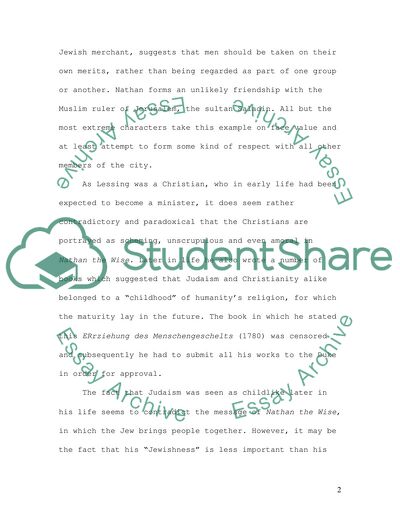
- Home
- Free Samples
- Premium Essays
- Editing Services
- Extra Tools
- Essay Writing Help
- About Us
- Studentshare
- Subjects
- Miscellaneous
- Lessing
Lessing - Essay Example

- Subject: Miscellaneous
- Type: Essay
- Level: Undergraduate
- Pages: 4 (1000 words)
- Downloads: 0
- Author: hoyt08
Extract of sample "Lessing"
more unusual for a writer to openly admit that his ideas may contradict one another, and even more so that he hopes that “disjunction” may actually provoke thought. In Nathan the Wise Lessing examines whether it is possible for cultures that have been at one another’s throats for centuries to actually move past these problems and come to a point of mutual respect. Lessing suggests that Jews, Christians and Muslims deserve to co-exist without attacking one another or being denigrated. Nathan, a wealthy Jewish merchant, suggests that men should be taken on their own merits, rather than being regarded as part of one group or another.
Nathan forms an unlikely friendship with the Muslim ruler of Jerusalem, the sultan Saladin. All but the most extreme characters take this example on face value and at least attempt to form some kind of respect with all other members of the city. As Lessing was a Christian, who in early life had been expected to become a minister, it does seem rather contradictory and paradoxical that the Christians are portrayed as scheming, unscrupulous and even amoral in Nathan the Wise. Later in life he also wrote a number of books which suggested that Judaism and Christianity alike belonged to a “childhood” of humanity’s religion, for which the maturity lay in the future.
The book in which he stated this ERrziehung des Menschengeschelts (1780) was censored and subsequently he had to submit all his works to the Duke in order for approval. The fact that Judaism was seen as childlike later in his life seems to contradict the message of Nathan the Wise, in which the Jew brings people together. However, it may be the fact that his “Jewishness” is less important than his basic qualities as a human being. Lessing was a tolerant man who preached religious tolerance, especially for Jews.
In a sense Lessing can be seen as inheriting the beliefs of Locke in his A Letter Concerning Toleration (1689), as Locke had also argued the idea that the
...Download file to see next pages Read More
- TERMS & CONDITIONS
- PRIVACY POLICY
- COOKIES POLICY